Sir Allan David Green, KCB, KC (born 1 March 1935) is a retired barrister in England and Wales. He was Director of Public Prosecutions and second head of the Crown Prosecution Service from 1987 to 1992.
Sir Allan David Green, KCB, KC (born 1 March 1935) is a retired barrister in England and Wales. He was Director of Public Prosecutions and second head of the Crown Prosecution Service from 1987 to 1992.
He was called to the bar in 1959 and rose to become a recorder (part-time judge) in 1979. Among his cases was the trial of the so-called 'Muswell Hill Murderer', serial killer Dennis Nilsen. After a successful career as a prosecution counsel, he was appointed Director of Public Prosecutions in 1987. In this role he was responsible for the majority of criminal prosecutions in England, and in his term of office he had to deal with the appeals against conviction of the Guildford Four and the Birmingham Six. Green resigned in October 1991, when he was spotted kerb-crawling in Kings Cross, London. [1]
Green continued with his career, however, both prosecuting and defending in important cases, particularly murders. Between 2000 and 2004, he represented ten British soldiers in the inquiry into the 1972 Bloody Sunday massacre, when 27 people were shot, 14 fatally, by British troops in Northern Ireland. [2] In answer to a question in Parliament in 2005, the Secretary of State for Northern Ireland said that Sir Allan had been paid £1.5 million for his work on the inquiry. [3]
Green is a member of Inner Temple, and remained a practising barrister in London until his retirement in 2013.
Green was portrayed by Jamie Parker in Des , a 2020 docudrama focusing on Dennis Nilsen.
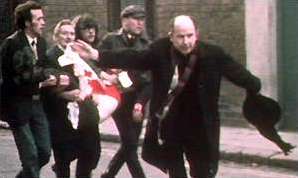
Bloody Sunday, or the Bogside Massacre, was a massacre on 30 January 1972 when British soldiers shot 26 unarmed civilians during a protest march in the Bogside area of Derry, Northern Ireland. Thirteen men were killed outright and the death of another man four months later was attributed to gunshot injuries from the incident. Many of the victims were shot while fleeing from the soldiers, and some were shot while trying to help the wounded. Other protesters were injured by shrapnel, rubber bullets, or batons; two were run down by British Army vehicles; and some were beaten. All of those shot were Catholics. The march had been organised by the Northern Ireland Civil Rights Association (NICRA) to protest against internment without trial. The soldiers were from the 1st Battalion of the Parachute Regiment, the same battalion implicated in the Ballymurphy massacre several months before.
"Stakeknife" was the code name of a high-level spy who successfully infiltrated the Provisional Irish Republican Army (IRA) while working for the Force Research Unit (FRU), a British military intelligence unit. Stakeknife allegedly worked as an FRU informant for 25 years.
James Brian Edward Hutton, Baron Hutton, PC was a British Lord Chief Justice of Northern Ireland and Lord of Appeal in Ordinary.
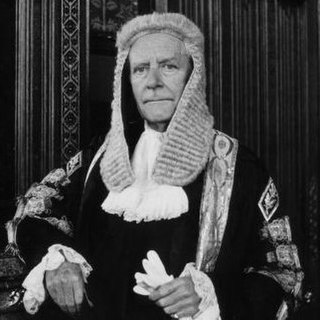
Robert Michael Oldfield Havers, Baron Havers,, was a British barrister and Conservative politician. He was knighted in 1972 and appointed a life peer in 1987.

The Crown Prosecution Service (CPS) is the principal public agency for conducting criminal prosecutions in England and Wales. It is headed by the Director of Public Prosecutions.

Dennis Andrew Nilsen was a Scottish serial killer and necrophile who murdered at least twelve young men and boys between 1978 and 1983. Convicted at the Old Bailey of six counts of murder and two of attempted murder, Nilsen was sentenced to life imprisonment on 4 November 1983, with a recommendation that he serve a minimum of 25 years; this recommendation was later changed to a whole life tariff in December 1994. In his later years, Nilsen was imprisoned at HM Prison Full Sutton in the East Riding of Yorkshire.
The Guildford Four and Maguire Seven were two groups of people, mostly Irish, who were wrongly convicted in English courts in 1975 and 1976 for the Guildford pub bombings of 5 October 1974, and the Woolwich pub bombing of 7 November 1974. All the convictions were eventually quashed after long campaigns for justice, and the cases, along with those of the Birmingham Six, diminished public confidence in the integrity of the English criminal justice system.

William Edgar Rayner Goddard, Baron Goddard, was Lord Chief Justice of England from 1946 to 1958, known for his strict sentencing and mostly conservative views despite being the first Lord Chief Justice to be appointed by a Labour government, as well as the first to possess a law degree. Goddard's no-nonsense reputation was reflected in a number of nicknames that he acquired, which included: 'The Tiger', 'Justice-in-a-jiffy', and—from Winston Churchill—'Lord God-damn'. He is considered one of the last hanging judges.

John Passmore Widgery, Baron Widgery, was an English judge who served as Lord Chief Justice of England from 1971 to 1980. He is principally noted for presiding over the Widgery Tribunal on the events of Bloody Sunday.
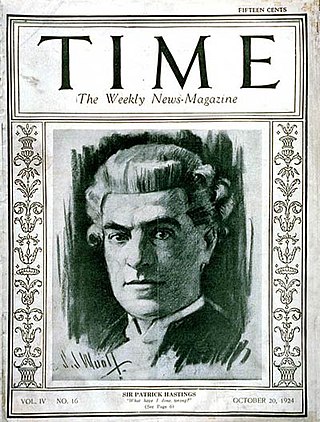
Sir Patrick Gardiner Hastings was an English barrister and politician noted for his long and highly successful career as a barrister and his short stint as Attorney General. He was educated at Charterhouse School until 1896, when his family moved to continental Europe. There he learnt to shoot and ride horses, allowing him to join the Suffolk Imperial Yeomanry during the Second Boer War. After demobilisation he worked briefly as an apprentice to an engineer in Wales before moving to London to become a barrister. Hastings joined the Middle Temple as a student on 4 November 1901, and after two years of saving money for the call to the bar he qualified as a barrister on 15 June 1904.
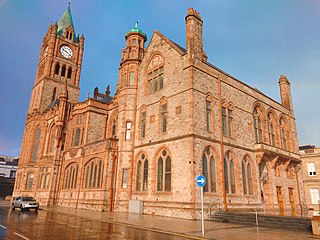
The Bloody Sunday Inquiry, also known as the Saville Inquiry or the Saville Report after its chairman, Lord Saville of Newdigate, was established in 1998 by British Prime Minister Tony Blair after campaigns for a second inquiry by families of those killed and injured in Derry on Bloody Sunday during the peak of The Troubles. It was published on 15 June 2010. The inquiry was set up to establish a definitive version of the events of Sunday 30 January 1972, superseding the tribunal set up under Lord Widgery that had reported on 19 April 1972, 11 weeks after the events, and to resolve the accusations of a whitewash that had surrounded it.
During the Troubles in Northern Ireland, British security forces were accused by some of operating a "shoot-to-kill" policy, under which suspected paramilitary members were killed without an attempt being made to arrest them. This alleged policy was claimed to be most frequently directed against suspected members of Irish republican paramilitary organisations, such as the Provisional Irish Republican Army (IRA), Official Irish Republican Army (OIRA) and Irish National Liberation Army (INLA). According to an 1985 inquiry by a team of international lawyers titled Shoot to Kill?, undercover security force units were "trained to shoot to kill even where killing is not legally justifiable and where alternative tactics could and should be used." The British government, including the Northern Ireland Office, consistently denied that there was ever a "shoot-to-kill" policy, stating that "like everyone else, the security forces must obey the law and are answerable to the courts for their actions."
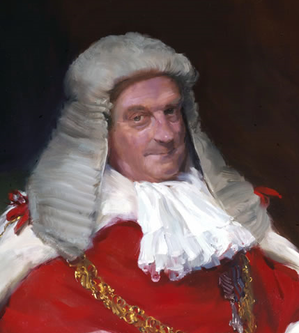
Geoffrey Dawson Lane, Baron Lane, was a British barrister and judge who served as Lord Chief Justice of England from 1980 to 1992, having previously served as a Lord of Appeal in Ordinary from 1977 until 1980.

Peter Anthony Grayson Rawlinson, Baron Rawlinson of Ewell, was an English barrister, Conservative politician and author. He served as Member of Parliament for Epsom for 23 years, from 1955 to 1978, and held the offices of Solicitor General (1962–1964) and Attorney General for England and Wales (1970–1974) and for Northern Ireland (1972–1974). Had he been appointed Lord Chancellor, as seemed likely during the mid-1970s, he would have been the first Roman Catholic to hold that position since Thomas More in 1532.
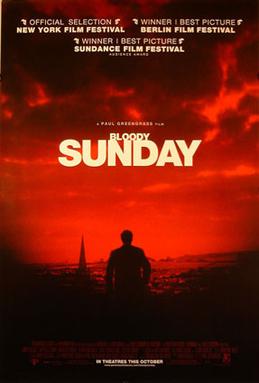
Bloody Sunday is a 2002 film written and directed by Paul Greengrass based around the 1972 "Bloody Sunday" shootings in Derry, Northern Ireland. Although produced by Granada Television as a TV film, it premiered at the Sundance Film Festival on 16 January, a few days before its screening on ITV on 20 January, and then in selected London cinemas from 25 January.
Major Sir Thomas Chalmers Hetherington,, better known as Sir Tony Hetherington, was a British barrister. He was Director of Public Prosecutions of England and Wales from 1977 to 1987, and was the first head of the Crown Prosecution Service for the year after it was founded in 1986.
Sir Norman John Skelhorn, KBE, QC was an English barrister who was Director of Public Prosecutions for England and Wales from 1964 to 1977.
Sir Henry Arthur Pears Fisher was an English lawyer who served as a judge of the High Court of England and Wales and as President of Wolfson College, Oxford.
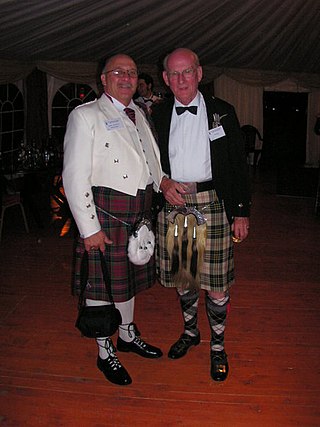
Sir William Alan Macpherson of Cluny, 6th of Blairgowrie was a judge of the High Court of England and Wales, and the 27th Hereditary Chief of Clan Macpherson. He was a common law barrister who served as the recorder of the Crown Court, a judge at the Queen's Bench, and the presiding judge of the Northern Circuit, before his retirement in 1996. In the late 1990s, Macpherson led the public inquiry into the murder of Stephen Lawrence. His report at the end of the enquiry in 1999 was considered groundbreaking and described as one of the most significant moments in the history of British criminal justice.
Sir Charles Barry Shaw, was a Northern Irish barrister. From 1972 to 1989, he served as the Director of Public Prosecutions for Northern Ireland; he was the first holder of this post.